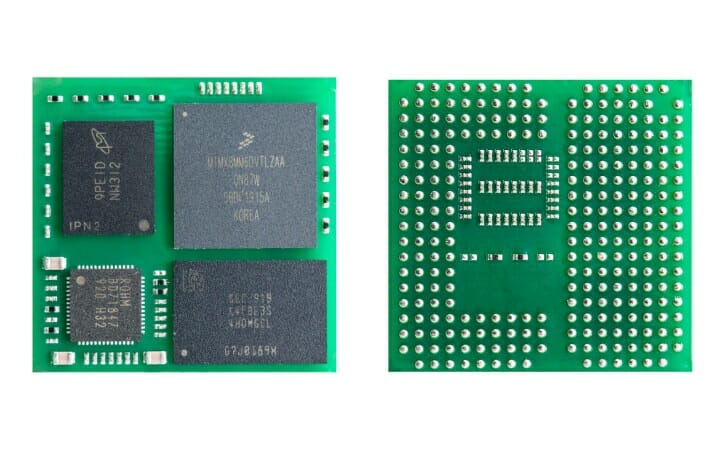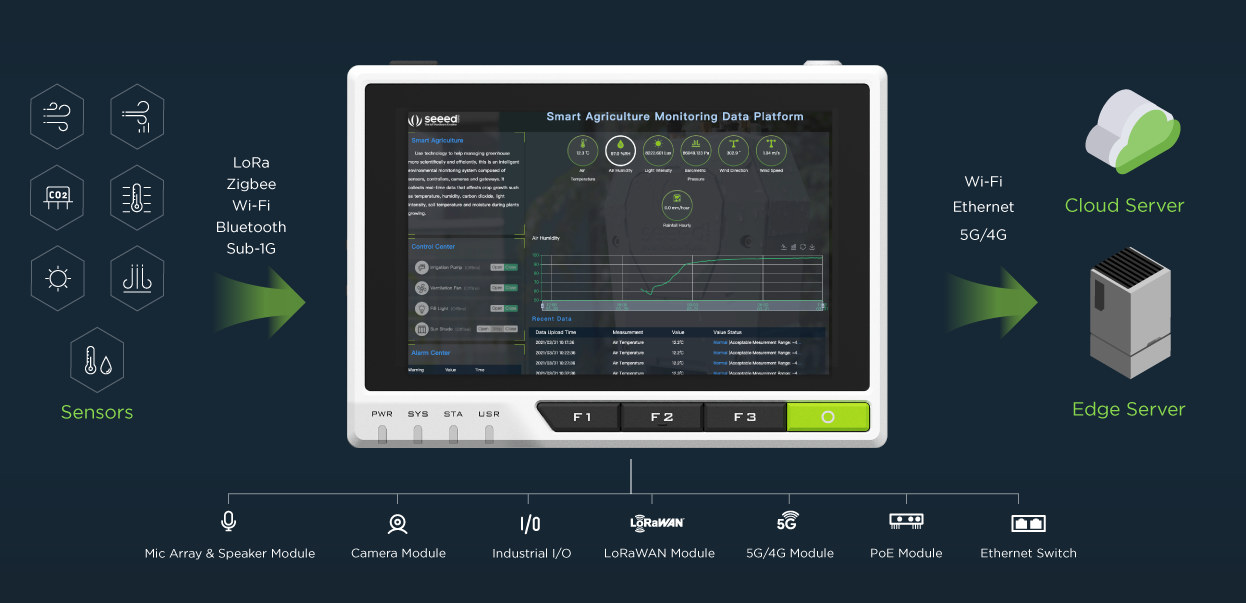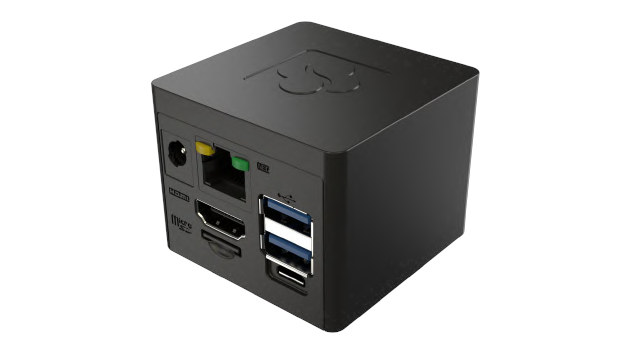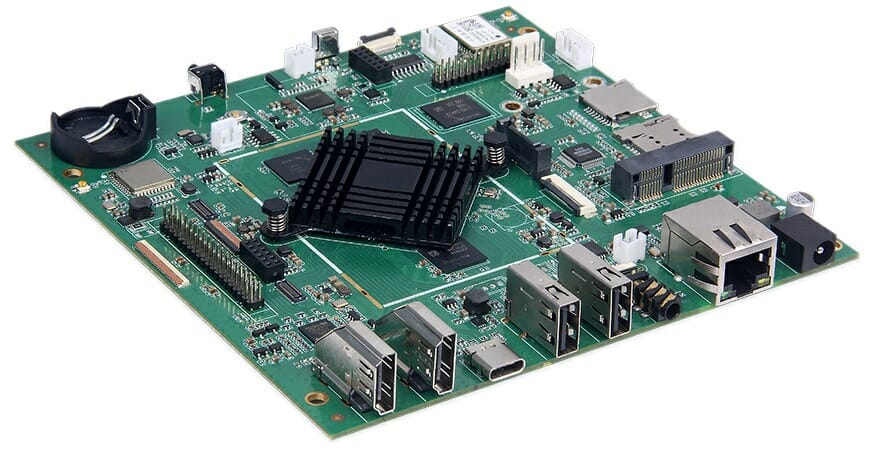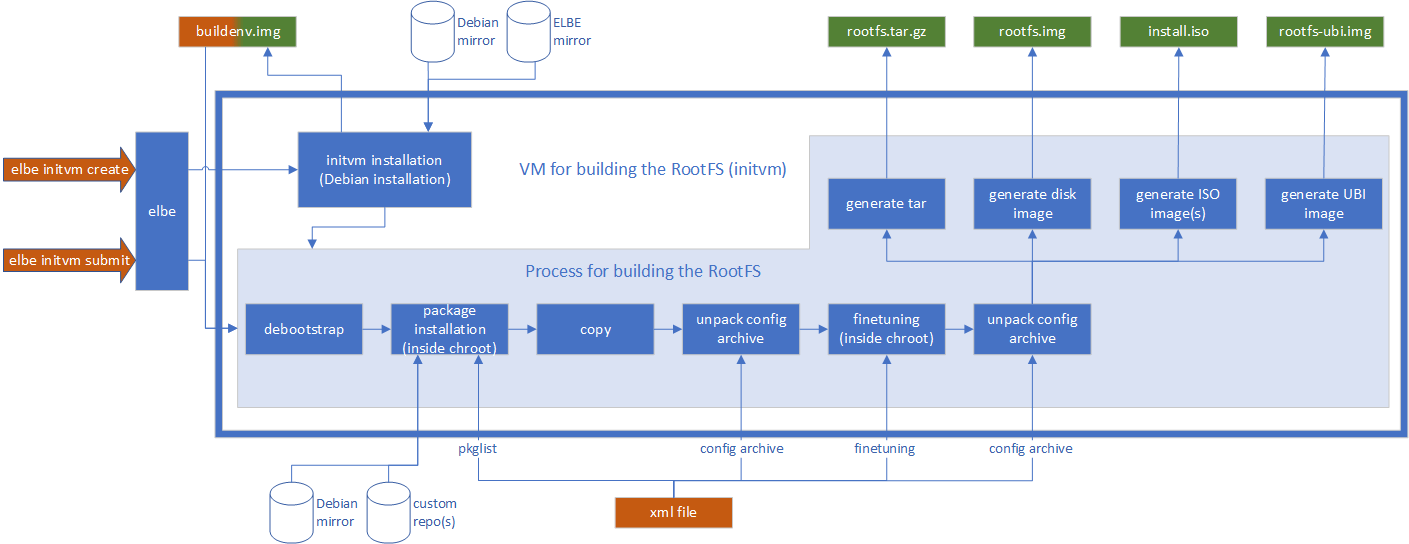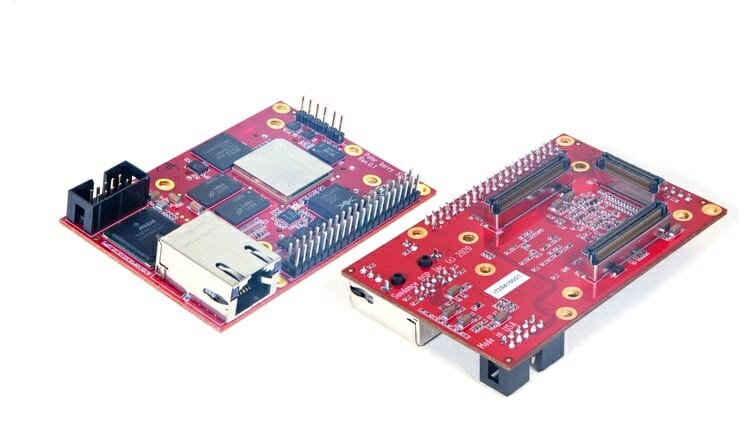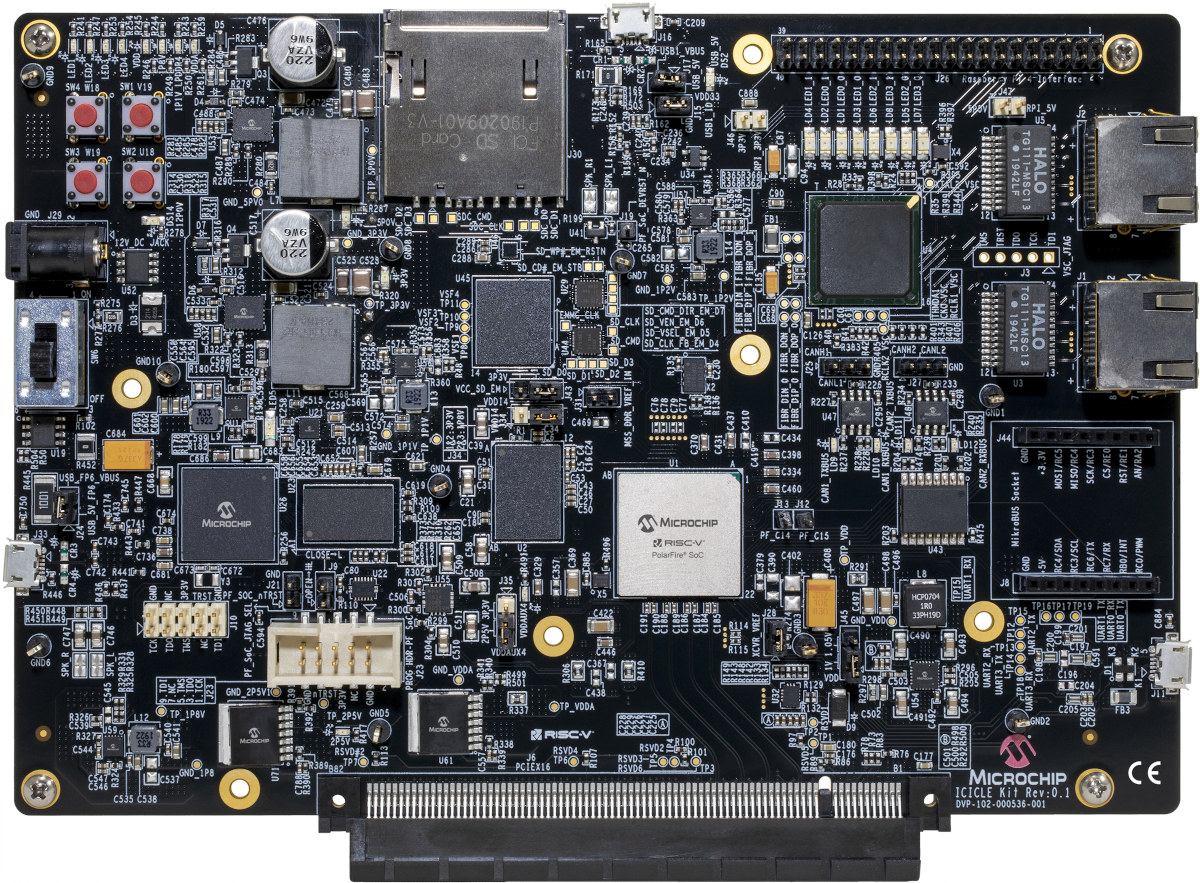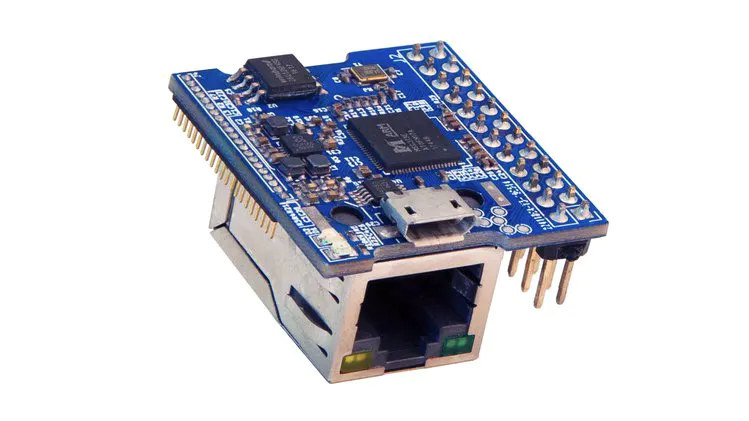The SGET (Standardization Group for Embedded Technologies) non-profit organization ratified another system-on-module standard last November, with the “Open Standard Module” (OSM) standard that instead of relying on edge or board-to-board connectors is meant to be soldered on the carrier board as a solder-on module LGA package. F&S Elektronik has unveiled one of the first SGET OSM compliant SoM with “FS 8MM OSM-SF” equipped with an NXP i.MX 8M Mini processor, up to 8GB DDR4, 32GB eMMC flash or 512MB NAND flash on a 30x30mm “Size-S OSM” form factor. FS 8MM OSM-SF system-on-module FS 8MM OSM-SF module specifications: SoC – NXP i.MX 8M Mini single, dual, or quad-core Arm Cortex-53 processor @ 1.8 GHz with real-time Cortex-M4 core @ 400 MHz, Vivante 2D & 3D GPU, 1080p60 H.265, VP9, H.264, VP8 video decoder System Memory – Up to 8GB LPDDR4 Storage – Up to max. 512MB SLC NAND flash or up […]
reTerminal – A Raspberry Pi CM4 based 5-inch HMI Terminal
Seeed Studio has just unveiled reTerminal HMI terminal that reminds me of the company’s Wio Terminal based on Microchip SAMD51 Arm Cortex-M4F microcontroller with a 2.4-inch display. But as we’ll look into the details, reTerminal is quite a different beast as a Linux-capable device powered by a Raspberry Pi CM4 module with up to 8GB RAM, equipped with a 5-inch capacitive touchscreen display, and supporting plenty of connectivity options from GIgabit Ethernet to WiFi to LoRaWAN. reTerminal specifications: SoM – Raspberry Pi Computer Module 4 with Broadcom BCM2711 quad-core Cortex-A72 processor @ 1.5 GHz, up to 8GB RAM, up to 32GB flash Display – 5-inch capacitive touchscreen display with 1280×720 resolution Video Output – Micro HDMI port up to 4Kp60 Camera I/F – 2-lane MIPI CSI inteface Connectivity Gigabit Ethernet with optional PoE support 802.11 b/g/n/ac WiFi and Bluetooth 5.0 BLE (on Raspberry Pi CM4 module) Optional 5G, 4G LTE, […]
SolidRun CuBox-M 2-inch Arm Linux/Android mini PC packs a 2.3 TOPS AI accelerator
SolidRun first introduced the tiny CuBox Arm Linux mini PC in 2011, with the device based on a Marvell Armada 510 dual-core Armv7 processor, and followed in 2013 with the launch of the CuBox-i family powered by Freescale i.MX 6 single to quad-core Cortex-A9 processor. The company moved to NXP i.MX 8M processor in 2018 with the introduction of CuBox Pulse, and now they’ve introduced their first Cubox mini PC with a built-in AI accelerator. Meet CuBox-M mini PC powered by NXP i.MX 8M Plus quad-core Cortex-A53 processor with a 2.3 TOPS NPU. Cubox-M mini PC specifications: SolidRun i.MX 8M Plus System-on-Module (SoM) SoC – NXP i.MX 8M Plus Quad quad-core Arm Cortex-A53 processor @ 1.8 GHz with Arm Cortex-M7 up to 800MHz, Vivante GC7000UL 3G GPU (Vulkan, OpenGL ES 3.1, OpenCL 1.2), 2.3 TOPS NPU, 1080p60 H.264/H.265 video encoder, 1080p60 video decoder (H.265, H.264, VP9, VP8), Candence HiFi4 audio […]
Geniatech RK3568 Development Board to support Android 11 and Linux
RK3566 and RK3568 are the latest AIoT processors from Rockchip equipped with four Arm Cortex-A55 cores, a Mali-G52 GPU, and an impressive range of peripherals that make them suitable for all sorts of applications including AI edge computing and network video recorder (NVR). We already know Pine64 is working on Quartz64 SBC based on Rockchip RK3566, but I’ve just noticed Geniatech’s “RK3568 development board” that should offer even more features since the processor comes with extra I/Os compared to its little brother. Let’s have a look. Geniatech RK3568 development board specifications: SoC – Rockchip RK3568 quad-core Cortex-A55 processor up to 2.0 GHz with Arm Mali-G52 GPU supporting OpenGL ES 1.1/2.0/3.2, OpenCL 2.0, Vulkan 1.1, 0.8 TOPS NPU for AI acceleration System Memory – Up to 4 GB LPDDR4 Storage – Up to 128 GB eMMC 5.1 flash, 1x SATA 3.0 port, MicroSD card slot, M.2 socket for NVMe SSD (See […]
ELBE is a simpler alternative to Yocto/OpenEmbedded and Buildroot
To support embedded design, there are several options when it comes to choosing an operating system (OS). Some of the traditional approaches to building custom Linux systems is to use built systems such as Yocto/OpenEmbedded or Buildroot. The options available for system integration include building everything manually, binary distributions (Debian, Ubuntu, Fedora, etc.), and build systems (Buildroot, Yocto, PTXdist, etc.). The major drawback of build systems is that they are not as easy as a binary distribution and also the build time is more. Why was ELBE born? In the early days, the embedded devices had 4MiB flash and 16MiB of RAM. With these specifications, people started to hack a root file system for their devices. But in some cases, they had to start with building a cross-toolchain first. For this, tools like OpenEmbedded, Buildroot are good as long as they are well maintained. For this, a lot of libraries […]
PolarBerry is a Compact, Linux-capable RISC-V FPGA SBC and module (Crowdfunding)
SiFive may just have announced a mini-ITX motherboard for RISC-V PCs, but if you’d like a RISC-V Linux platform in a more compact form factor, Sundance PolarBerry may better fit your requirements, albeit the board will target different use cases. Powered by Microchip PolarFire RISC-V SoC FPGA, PolarBerry is both a single board computer with Gigabit Ethernet and 40-pin GPIO header, as well as a system-on-module thanks to three Samtec board-to-board connectors. PolarBerry specifications: SoC – Microsemi PolarFire FPGA MPFS250T-FCVG484 penta-core processor with 1x RV64IMAC monitor core, 4x RV64GC application cores, FPGA fabric with 254K x logic elements (4LUT + DFF), 784 x math blocks (18 x 18 MACC), and 16 x SERDES lanes at 12.5 Gbps; 12 W maximum power consumption System Memory – 4 GB of 32-bit wide DDR4 memory Storage – 4GB eMMC flash, 128 Mbit SPI Serial NOR flash for boot image Networking – Gigabit Ethernet […]
PolarFire SoC Icicle 64-bit RISC-V and FPGA Development Board Runs Linux or FreeBSD (Crowdfunding)
We got some more details about PolarFire RISC-V FPGA SoC late last year, and we were promised a Linux capable 64-bit RISC-V & FPGA development board with PolarFire SoC Icicle kit in Q3 of 2020. We are already in July 2020. So where is the board? Oh, look! It’s right here on Crowd Supply where it is offered for $499, and shipping is expected to start in mid-September. PolarFire SoC Icicle specifications: SoC FPGA – PolarFire SoC MPFS250T-FCVG484EES penta–core RISC-V CPU subsystem (1xRV64IMAC, 4xRV64GC) with 254K LE non-volatile fabric, 784 18 × 18 math blocks, secure boot, 4x 12.7 Gbps SERDES, FCVG484 package (19 × 19 mm, 0.8 mm pitch) System Memory – 2GB LPDDR4 x32 Storage – 1 GBit QSPI Flash, 8GB eMMC Flash or SD card slot (multiplexed) Video Output – HDMI 2.0 (removed from final board) Connectivity – 2x Gigabit Ethernet, Wi-Fi, and Bluetooth USB – 1x […]
BreadBee is a Tiny Embedded Linux SBC based on MStar MSC313E Camera SoC (Crowdfunding)
There are plenty of tiny and compact Arm Linux SBC on the market from NanoPi NEO to Raspberry Pi Zero or Rock Pi S. But Daniel Palmer has been able to design an even smaller board – BreadBee – based on MStar MSC313E Cortex-A7 SoC since the processor also embeds 64MB RAM, or enough to run embedded Linux.BreadBee specifications: SoC – MStar MSC313E Arm Cortex-A7 processor @ ~1.0 GHz with NEON, FPU, 64MB DDR2 Storage – 16MB SPI NOR flash Networking – 10/100M Ethernet (RJ45) USB – 1x Micro USB 2.0 port Expansion 24-pin dual-row header (2.54mm pitch) with SPI, I2C, 4x 10-bit ADC, 3x UART, GPIOs 21-pin header (1.27mm pitch) with SD/SDIO, USB 2.0, GPIOs Misc – RTC, Watchdog timer Power Supply – 5V via micro USB port Dimensions – 32 x 30mm Despite MStar MSC313E being a camera processor, the camera interface does not seem exposed in the […]


